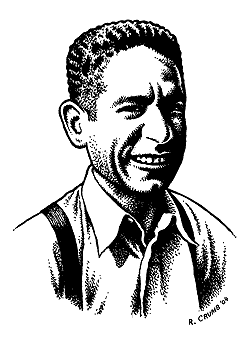Now that the House of Representatives has excised Arctic drilling from the budget bill, we can stop worrying about polar bears and the threat of Exxon Valdez II—at least for a few weeks—and attend to a more pressing matter: Jelly Roll Morton’s The Complete Library of Congress Recordings by Alan Lomax (Rounder). Impeccably remastered—mostly from unworn safety copies of the original recordings—and digitally pitch corrected to eliminate the flaws that have dogged previous 78, LP, and CD excerpts, the lavishly produced, piano-shaped box set marks the first release of the 1938 interview-and-music sessions in their chronologically correct entirety ever, offering a delightfully detailed, panoramic view of the 20th century’s first few decades.
That Morton, the seminal New Orleans composer, pianist, vocalist, and pool hustler, so much as got together with Lomax was itself a bit of a miracle. While only 23, Lomax had already established himself in folkloric circles with recordings of Lead Belly and various artists in the Caribbean. Despite his proficiency in blues and ragtime, Morton was associated primarily with jazz, the reigning pop music genre of the era. Hence, to Lomax, he was the enemy. But Morton, then in his 50s and the proprietor of a little nightspot in Washington, D.C., was justifiably pissed. The aptly handled Paul Whiteman had already reaped unearned props galore as the “king of jazz,” while ambitious Johnny-come-lately W.C. Handy was successfully promoting himself as the “father of the blues.” To Morton, too many worthy souls—himself included—teetered on the brink of history’s Dumpster. He knew that Lomax, then virtually running the Library of Congress’ Archive of Folk Music single-handed, could help him set the record straight.
And Lomax did—though not so much because of Morton’s oft-repeated claims that he was the “inventor of jazz piano,” a job title that would have interested Lomax little. An impromptu, one-on-one rendition of “Alabama Bound” at the library’s Coolidge Auditorium convinced the archivist that Morton loomed every bit as large in the history of American music as he told anyone who’d listen he did. Lomax acted immediately. After getting the green light from his boss, Lomax grabbed 50 blank aluminum discs, two cheap recorders, a microphone, and a bottle of whiskey conveniently stashed in his office. Returning to the auditorium, he set up the gear, sat on the floor, and got what turned out to be a very long ball rolling with a simple question: “Jelly Roll, where did you come from and how did it all begin?”
The bottle and its successors helped both Lomax and the man he came to consider a “Creole Benvenuto Cellini” enormously in the coming months. Sure, Morton rambled a bit, just as his chronicler didn’t change the 78 rpm discs—each offering less than five minutes of recording time per side—quite as often as the situation demanded at first. But Lomax learned to move quickly, and Morton to pause as the story of his life, New Orleans, and its music rolled off his tongue like honey as he accompanied himself magnificently on the library’s grand piano.
Morton does quite a bit of singing and pure playing over the course of the box’s seven discs as well, dropping revelations like a pigeon drops organic mementos. Who knew that the “Every party needs a pooper/That’s why we invited you” song originated as a turn-of-the-last-century hit called “Pretty Baby”? Or that Country Joe and the Fish’s “Feel-Like-I’m-Fixin’-to-Die Rag” is a direct rip-off of a Morton instrumental called “Kansas City Stomp”? Despite a chronic tendency to disparage his own vocal chops, Morton sings beautifully, easily waxing dreamy or low-down according to the tune’s demands. He does a great deal of the latter on “Make Me a Pallet on the Floor,” a blues he claims was written long before his birth (1885–90, depending on whom you ask; no one has ever come up with a birth certificate). Like a few other songs in the set, the adulterer’s anthem stands as the perfect introduction for teens and ‘tweens who think they have no interest in old-time music; Morton employs contemporary epithets as readily and adroitly as both Ying Yang Twins combined, climaxing with a passionately belted, “Throw your legs up like a great church steeple/So I can think I’m fuckin’ all the people,” before ending with “You the fuckin’est bitch/That I ever had.”
Still, Morton’s strengths as a player and singer were a matter of record long before he hooked up with Lomax; it’s the narrative that makes The Complete Library of Congress Recordings the treasure it is. A natural storyteller who crossed race and class lines as easily as he crossed state ones, Morton is careful to sing the praises of peers, even placing the likes of pianist Tony Jackson and pioneering gay dope fiend Alfred Wilson higher in the New Orleans pantheon than himself. He’s great with hookers, hoodoo women, and thugs, too. His account even dips into surrealist waters when, virtually out of nowhere, he announces: “There are only two things I wanted that I never got. One was a yacht, the other was a cow.” Of course! Who doesn’t?
True to its name, Rounder enhances Morton’s epic with a disc of interviews with a few of his contemporaries, along with two books: Lomax’s groundbreaking Mr. Jelly Roll and a copiously illustrated, 70-page appreciation with notes by jazz critic and biographer John F. Szwed. (Disc eight also includes unrecorded interview transcripts in multiplatform PDF.) But all of this is frosting on a very big cake constructed by Morton and Lomax—none of which would have happened if not for the archive, part of a New Deal that many congressional Republicans and allies continue to attack, which is nothing new. Some disapproved of Lomax’s mission so strongly that Congress cut his already meager funding for a while. Fuckers. Let ’em ride cows.








